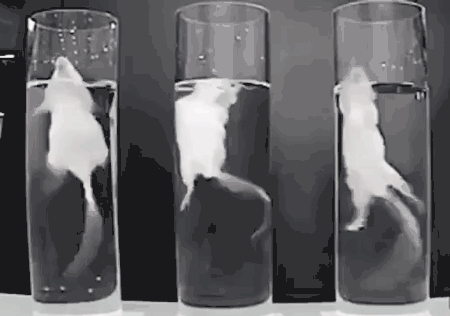5 Ways to Tell Eli Lilly to Ban Near-Drowning Tests on Mice!
Eli Lilly has refused to ban the forced swim test, an archaic test that’s as cruel as it is worthless. In it, experimenters administer a drug to mice, rats, guinea pigs, hamsters, or gerbils and put the animals in inescapable containers filled with water. The panicked animals try to escape by attempting to climb up the sides of the beakers or even diving underwater in search of an exit. They paddle furiously, desperately trying to keep their heads above water. Eventually, they’ll start to float.
In recent public statements, Eli Lilly has said that it hasn’t used the test “for some time.” Here’s a reality check: In published papers, Eli Lilly has documented its use of close to 3,500 mice and rats in the test. That’s almost 3,500 animals made to suffer in an experiment that’s no more predictive of a successful treatment for depression than a coin toss is. And the company published about engaging in this torment as recently as March 2019. Since these are just the published reports, it’s likely that many more forced swim tests were conducted but never reported in papers.
Both mice and rats are highly social animals. They become attached to each other, love their own families, and easily bond with their human guardians—returning as much affection as is given to them. Many rats will even “groom” a human companion’s hand and would appreciate a massage, a scratch behind the ears, or even a tickle in return.
Recent studies by Jaak Panksepp, a neuroscientist at Bowling Green State University in Ohio, suggest that when rats play or are playfully tickled, they make chirping sounds that are strikingly similar to human laughter. The rats he studied also bonded socially with the human tickler and even sought to be tickled more. Panksepp corroborates what rat lovers have known all along: “[Y]oung rats have a marvelous sense of fun.”
Tell Eli Lilly to ban near-drowning tests in five steps:
1. Call Eli Lilly’s headquarters.
Dial 317-276-2000 (then press 0) and urge the company’s CEO, David Ricks, to join Johnson & Johnson, AbbVie Inc., Roche, AstraZeneca, Novo Nordisk A/S, Boehringer Ingelheim, Pfizer, and Bristol-Myers Squibb in banning the archaic and cruel forced swim test.
Here are some talking points:
- For decades, countless mice and rats have suffered in this test conducted by Eli Lilly.
- Publications describing the company’s use of the test show that it hasn’t led to any marketable drugs to treat human depression.
- Animals are not laboratory equipment but living, feeling beings, and this test is as cruel as it is ineffective.
Please let us know how your call to Eli Lilly went below. By submitting this form to PETA, you are not taking action or contacting the company. This is a feedback form to help us improve the call-in experience.
By submitting this form, you’re acknowledging that you have read and agree to our privacy policy and agree to receive e-mails from us.
2. Use your social media accounts to contact Eli Lilly.
Eli Lilly CEO David Ricks thinks he can turn a deaf ear to calls to ban the forced swim test, even though it has been criticized and banned by major pharmaceutical companies, including Pfizer and Johnson & Johnson. Post a comment on Ricks’ Instagram account, @davearicks, urging him to ban the test.
Then leave a comment on Eli Lilly’s Facebook page, and tweet to the company at @LillyPad.
3. Send a postcard to Ricks.
Eli Lilly published about using the forced swim test as recently as 2019—it’s time to ban this archaic test.
Please print and sign our card to Eli Lilly. Fold and tape it, and put a stamp on it before sending it to Ricks. (The card is already addressed to him.) Tell him that enough is enough.
4. E-mail the company.
Urge the company to ban the test right now.
5. Share this video.
Share this video with your friends and family.


